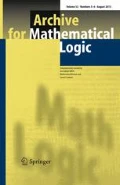Abstract
We consider the well-known provability logic GLP. We prove that the GLP-provability problem for polymodal formulas without variables is PSPACE-complete. For a number n, let \({L^{n}_0}\) denote the class of all polymodal variable-free formulas without modalities \({\langle n \rangle,\langle n+1\rangle,...}\). We show that, for every number n, the GLP-provability problem for formulas from \({L^{n}_0}\) is in PTIME.
Similar content being viewed by others
References
Beklemishev L.D.: Reflection principles and provability algebras in formal arithmetic. Russ. Math. Surv. 60, 197–268 (2005)
Beklemishev, L.D.: Veblen hierarchy in the context of provability algebras. In: Logic, Methodology and Philosophy of Science, Proceedings of the Twelfth International Congress, pp. 65–78. Kings College Publications (2005)
Beklemishev L.D., Fernández-Duque D., Joosten J.J.: On provability logics with linearly ordered modalities. Studia Logica 102(3), 541–566 (2014)
Beklemishev L.D., Joosten J.J., Vervoort M.: A finitary treatment of the closed fragment of Japaridze’s provability logic. J. Logic Comput. 15(4), 447–463 (2005)
Bou F., Joosten J.J.: The closed fragment of il is pspace hard. Electron. Notes Theor. Comput. Sci. 278, 47–54 (2011)
Chagrov, A.V., Rybakov, M.N.: How many variables does one need to prove PSPACE-hardness of modal logics. In: Advances in Modal Logic, pp. 71–82 (2002)
Cook S.A., Reckhow R.A.: Time bounded random access machines. J. Comput. Syst. Sci. 7(4), 354–375 (1973)
Dashkov E.: On the positive fragment of the polymodal provability logic GLP. Math. Notes 91, 318–333 (2012)
Ignatiev K.N.: On strong provability predicates and the associated modal logics. J. Symb. Log. 58(1), 249–290 (1993)
Japaridze, G.K.: The modal logical means of investigation of provability. Thesis in Philosophy, Moscow (in Russian) (1986)
Joosten, J.J.: Interpretability formalized. Ph.D thesis, Utrecht University (2004)
Ladner R.E.: The computational complexity of provability in systems of modal propositional logic. SIAM J. Comput. 6(3), 467–480 (1977)
Shapirovsky, I.: PSPACE-decidability of Japaridze’s polymodal logic. In :Advances in Modal Logic, pp. 289–304 (2008)
Stockmeyer, L.J., Meyer, A.R.: Word problems requiring exponential time (preliminary report). In: Proceedings of the Fifth Annual ACM Symposium on Theory of Computing, STOC ’73, pp. 1–9, New York, NY, USA, ACM (1973)
Švejdar V.: The decision problem of provability logic with only one atom. Arch. Math. Logic 42(8), 763–768 (2003)
Author information
Authors and Affiliations
Corresponding author
Rights and permissions
About this article
Cite this article
Pakhomov, F. On the complexity of the closed fragment of Japaridze’s provability logic. Arch. Math. Logic 53, 949–967 (2014). https://doi.org/10.1007/s00153-014-0397-4
Received:
Accepted:
Published:
Issue Date:
DOI: https://doi.org/10.1007/s00153-014-0397-4




